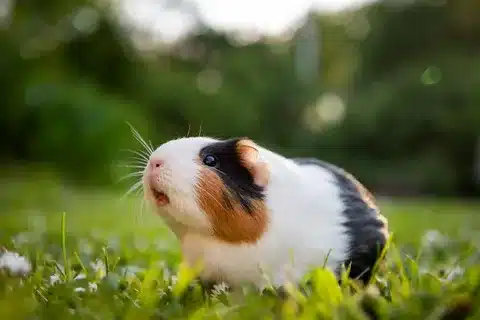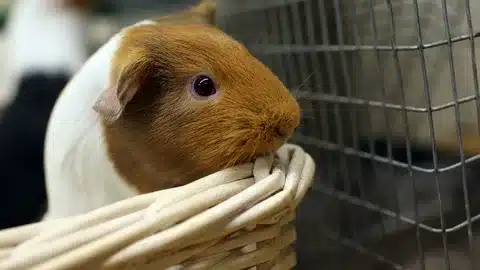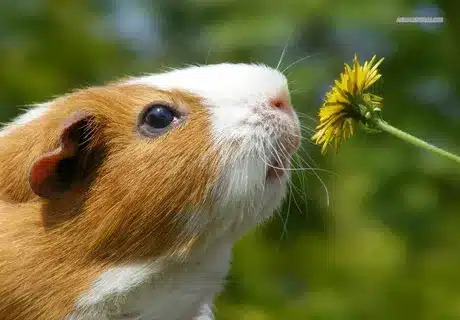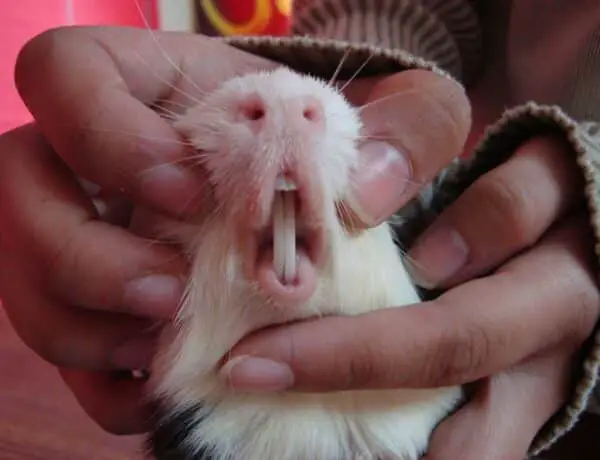Introduction
Introducing a guinea pig as a potential pet raises a fundamental question: Is a guinea pig a good pet choice for you? Guinea pigs, often referred to as “cavies,” are adorable and gentle creatures that have become popular pets for numerous reasons. In this introduction, we’ll explore why guinea pigs can make excellent companions for the right individual or family.
Guinea pigs are known for their endearing personalities and charming characteristics, which make them delightful additions to households looking for a small, low-maintenance pet. They are generally easy to care for, and their unique qualities can provide both children and adults with a rewarding pet ownership experience.
These rodents are known for their sociable nature. Guinea pigs often form strong bonds with their owners, enjoying interactions and even “talking” through a series of vocalizations like squeaks and purrs. Their gentle temperament makes them ideal for families or individuals seeking a pet that is friendly and easy to handle.

Is a guinea pig easy to take care of?
Guinea pigs are relatively easy to care for and are hardy little animals. They require hay, fresh water, fresh vegetables and pelleted food formulated for guinea pigs. They also need a fairly large cage lined with paper-based bedding. The cage needs to be spot-cleaned daily and completely cleaned weekly
Caring for Guinea Pigs: Ease of Maintenance
Guinea pigs are often considered relatively easy to take care of as pets, but several important factors should be considered.
Low Grooming Needs: Guinea pigs have minimal grooming requirements. Their fur is generally short and low-maintenance, reducing the need for extensive brushing or grooming.
Compact Size: Their small size makes them a practical choice for individuals with limited living space, such as apartments or smaller homes.
Simple Diet: Their dietary needs are straightforward and consist primarily of hay, fresh vegetables, and high-quality guinea pig pellets, making it easy to provide a balanced diet.
Clean Habits: Guinea pigs tend to be tidy animals, and they often choose a specific area of their enclosure for waste, simplifying cleanup.
Social Nature: They are social animals that enjoy companionship, and it’s recommended to keep them in pairs or groups to prevent loneliness and stress.
Health Care: Guinea pigs require regular health check-ups and access to a veterinarian knowledgeable about their specific needs. This includes dental care and vaccinations.
Handling: They are generally gentle and easy to handle, making them suitable pets for families with children when supervised.
Are pet guinea pigs friendly?
What’s more, tame piggies don’t just tolerate attention – they love it! Guinea pigs are really social, and they like to be stroked, cuddled and hand-fed. Since they’re so friendly, guinea pigs can make great companions for children.
Friendliness of Pet Guinea Pigs: A Social Bond
Guinea pigs are renowned for their friendly and affectionate nature, often forming strong bonds with their human caregivers. Here’s a closer look at why pet guinea pigs are considered friendly animals:
Sociable Creatures: Guinea pigs are highly social animals that thrive on companionship, both with their fellow guinea pigs and with their human owners. They enjoy interaction and can become quite attached to their caregivers.
Gentle Temperament: Their gentle and docile temperament makes them excellent pets, particularly for families with children. They are less likely to bite or scratch when handled correctly.
Vocal Communication: Guinea pigs are known for their vocalizations, which include soft purring sounds of contentment and excited squeaks when they anticipate food or attention. They readily communicate their needs to their caregivers.
Respond to Handling: Pet guinea pigs often become accustomed to being handled and enjoy lap time with their owners. Regular interaction helps build trust and strengthens the human-pig bond.
Recognize Caregivers: Guinea pigs can learn to recognize their owners and may greet them with enthusiasm, especially during feeding times.
Enjoy Petting and Cuddling: Many guinea pigs appreciate gentle petting and cuddling sessions. They often relax and purr when being affectionately stroked.
Bonding over Time: While some guinea pigs may be initially shy or reserved, with time and patience, they typically warm up to their caregivers and become increasingly friendly.
Is a guinea pig good for the house?
Guinea pigs make great pets. They live for several years, so you can enjoy them longer than most other rodents. They have different personalities and are very vocal, making it easy to know their individual identities and get attached. They are fun to play with and very entertaining.
Guinea Pigs as House Pets: A Delightful Addition
Guinea pigs can make excellent house pets for many reasons, offering a unique and enjoyable experience for individuals and families alike.
Compact Size: Their small size and low space requirements make them well-suited for indoor living. A spacious cage or enclosure can easily fit within a home.
Quiet Companions: Guinea pigs are generally quiet animals, which means they won’t disrupt the peace and tranquility of your home with loud noises.
Low Allergenicity: They are considered hypoallergenic pets, making them a suitable choice for individuals with mild allergies to animals.
Minimal Odor: With proper care and hygiene, guinea pigs are not known for emitting strong or unpleasant odors, allowing for a pleasant living environment.
Gentle Temperament: Guinea pigs are docile and friendly, making them great companions for families with children. They are less likely to bite or exhibit aggressive behavior.
Interactive and Social: They enjoy interaction with their human caregivers and are known for forming strong bonds with their owners. This social nature can enhance the overall household experience.
Visual Appeal: Their adorable appearance, expressive eyes, and charming behaviors can provide entertainment and a sense of joy to your home.
Educational Value: Having guinea pigs as house pets can be educational, especially for children. It teaches responsibility, empathy, and respect for animals.
Is it difficult to pet a guinea pig?
While guinea pigs may be nervous or skittish at first, with consistent gentle handling, they usually become tame very easily. Careful handling is a must, and children should be supervised with them, but they are unlikely to bite even when stressed.
Petting a Guinea Pig: Simplicity and Enjoyment
Petting a guinea pig is generally not difficult and can be a delightful and rewarding experience for both the pet and the owner. Here’s why:
Docile Nature: Guinea pigs are known for their gentle and docile temperament. They are generally calm and less likely to bite or scratch when handled correctly.
Interactive and Social: Guinea pigs often enjoy human interaction and can form strong bonds with their owners. Regular handling and petting can strengthen the human-pig bond.
Trust Building: Establishing trust with a guinea pig is key. Start with gentle, slow movements, and speak softly to reassure them. Gradually increase the amount of handling as the pig becomes more comfortable.
Lap Time: Many guinea pigs enjoy spending time on their owners’ laps, where they can be petted, cuddled, and even groomed. Lap time can be a pleasant bonding experience.
Communication: Guinea pigs communicate through their body language and vocalizations. Pay attention to their cues; if they nuzzle your hand or purr contentedly, they are likely enjoying the petting.
Avoid Sensitive Areas: Be mindful of sensitive areas like the eyes, ears, and genitalia. Gentle stroking along their back and neck is typically appreciated.
Consistency: Consistent and gentle handling from a young age can make guinea pigs more comfortable with human interaction.
Can 1 guinea pig live alone?
To summarize, a guinea pig can live alone, but ideally shouldn’t. This is because they are social animals that want and need the companionship of other guinea pigs. A piggy on its own requires a lot of care and interaction, which is why experts recommend keeping at least two guinea pigs together.
Can a Guinea Pig Live Alone
While guinea pigs are highly social animals that naturally thrive in the company of their kind, it is possible for a guinea pig to live alone under specific circumstances. However, there are several important considerations to keep in mind:
Loneliness and Stress: Guinea pigs are social creatures that form strong bonds with their cage mates. When kept alone, they can experience loneliness, boredom, and stress, which may negatively impact their physical and mental well-being.
Companionship Requirement: It’s generally recommended to keep guinea pigs in pairs or small groups to meet their need for companionship. Two or more guinea pigs can engage in social behaviors, reducing the risk of loneliness.
Increased Attention: If you choose to keep a single guinea pig, you’ll need to provide extra attention and social interaction to compensate for the absence of a cage mate. Daily handling and playtime outside the cage become even more critical.
Potential Aggression: Introducing a new guinea pig to an existing one can sometimes be challenging due to territorial or aggressive behaviors. Proper introduction and supervision are necessary.
Special Circumstances: Some guinea pigs may have specific health issues or behavioral problems that make them unsuitable companions for others. In such cases, they may need to live alone for their safety and well-being.
How long does 1 guinea pig live?
Guinea pigs live an average of five to seven years. This lifespan is longer than many other small pets such as hamsters, gerbils, mice or rats, all of whom only live up to a few years.
The Lifespan of a Single Guinea Pig
The lifespan of a guinea pig can vary depending on several factors, including genetics, diet, living conditions, and overall care. On average, a single guinea pig typically lives for about 5 to 7 years, although some may live longer, even up to 8 years or more.
Genetics: Some guinea pigs may have longer or shorter lifespans due to their genetic predisposition. Healthy lineage and careful breeding practices can contribute to a longer life.
Diet: Providing a well-balanced diet rich in fresh vegetables, high-quality guinea pig pellets, and hay is crucial for their longevity. Nutritional deficiencies can impact their health.
Living Conditions: Guinea pigs thrive in clean, spacious, and well-maintained environments. Proper ventilation and temperature control can play a role in their health and lifespan.
Veterinary Care: Regular veterinary check-ups are essential to monitor their health and catch any potential issues early. Vaccinations, dental care, and parasite control are part of a comprehensive healthcare plan.
Social Interaction: Companionship with other guinea pigs can positively impact their mental and emotional well-being, potentially contributing to a longer, happier life.
Avoiding Stress: Reducing stressors in their environment, such as loud noises or excessive handling, can help maintain their overall health.
Is it safe to touch a guinea pig?
Be careful not to crunch any of his legs. Instead, let them hang over your hand. Hold your guinea pig close to your chest to help him to feel secure. You can even pet him gently with your free hand.
Safety and Guinea Pig Handling: Tips for a Positive Experience
Touching and handling guinea pigs is generally safe and enjoyable, both for the pet and the owner. However, it’s essential to follow proper guidelines to ensure the safety and comfort of your guinea pig:
Wash Your Hands: Before and after handling your guinea pig, wash your hands thoroughly with mild soap and warm water. This prevents the transmission of germs and ensures a clean environment for your pet.
Gentle Approach: Approach your guinea pig calmly and gently. Slowly extend your hand for them to sniff and become accustomed to your scent.
Support Their Body: When picking up your guinea pig, use both hands to support their entire body. Cradle them against your chest and ensure their feet are secure.
Avoid Sudden Movements: Avoid sudden movements, loud noises, or handling when your guinea pig appears frightened or anxious. This can stress them.
Supervise Children: Supervise young children when handling guinea pigs to prevent accidental drops or rough handling. Teach them to be gentle and patient.
Limit Handling Time: Guinea pigs may become stressed with excessive handling. Limit sessions to 10-15 minutes at a time and give them time to rest between interactions.
Respect Their Preferences: Not all guinea pigs enjoy being held or cuddled. Some may prefer lap time, while others may enjoy floor time for exercise and exploration.
Avoid Sensitive Areas: Be mindful of sensitive areas like the eyes, ears, and genitalia while petting or handling your guinea pig.
Do guinea pigs smell in the house?
In a nutshell, guinea pigs shouldn’t smell. If they are giving off an unpleasant odor, it’s usually a sign that the cage isn’t clean, their diet is wrong, they’re sick, or they’re struggling to groom themselves. Also, boars may smell more than sows because of an oily buildup around the grease gland.
Guinea Pigs and Household Odor: Managing Smell
Guinea pigs are generally not known for producing strong or unpleasant odors, especially when compared to some other pets. However, like any pet, they do require proper care and maintenance to ensure a clean and odor-free living environment. Here’s how to manage any potential odors associated with guinea pigs:
Clean Habitat: Regularly clean your guinea pig’s cage or enclosure. Remove soiled bedding, food remnants, and waste daily. A clean living space is essential to prevent odors from accumulating.
Proper Bedding: Choose appropriate bedding materials, such as paper-based bedding or fleece liners, that help absorb moisture and control odor. Change bedding as needed to maintain cleanliness.
Adequate Ventilation: Ensure proper ventilation in the room where your guinea pigs are housed. Good air circulation helps disperse odors.
Timely Waste Removal: Clean your guinea pig’s litter box regularly, removing soiled bedding and replacing it with fresh bedding. Properly dispose of waste.
Fresh Water and Food: Provide fresh water daily and monitor their diet to prevent overfeeding, which can contribute to odors in their waste.
Quality Diet: Feed your guinea pigs a balanced diet with high-quality hay, fresh vegetables, and guinea pig pellets. A proper diet can help regulate their digestion and minimize odor.
Absorbent Cage Liners: Consider using absorbent cage liners or mats to collect moisture and droppings, making cleanup more manageable.
Hygiene Practices: Maintain proper personal hygiene, including washing your hands before and after handling your guinea pigs. This helps prevent any odor transfer from your hands to the environment.

Conclusion
A guinea pig can be a wonderful pet choice for the right individual or family. These gentle and charming creatures offer several advantages as companions. They are relatively low-maintenance, making them suitable for first-time pet owners and families with children. Guinea pigs are known for their friendly and sociable nature, often forming strong bonds with their owners. Their small size and minimal space requirements make them ideal for homes with limited living space. Additionally, their clean habits and straightforward dietary needs simplify their care routine.
However, it’s essential to recognize that guinea pigs also come with responsibilities. Proper care, attention, and a commitment to their well-being are necessary to ensure they thrive as pets. They may have a lifespan of around 5-7 years or more, requiring a long-term commitment. Guinea pigs may not be suitable for households looking for highly interactive or trainable pets, as they have their own unique behaviors and limitations.
Ultimately, whether a guinea pig makes a good pet depends on your lifestyle, preferences, and the level of care and companionship you can provide. When given the appropriate love and care, guinea pigs can make delightful and rewarding additions to many households.





No Comments